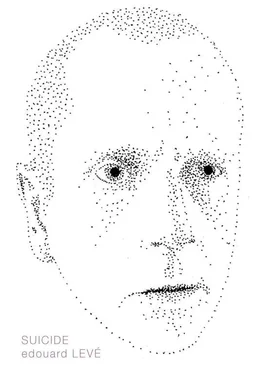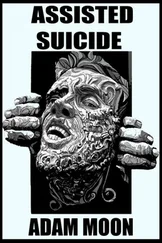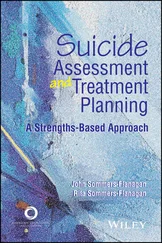Édouard Levé - Suicide
Здесь есть возможность читать онлайн «Édouard Levé - Suicide» весь текст электронной книги совершенно бесплатно (целиком полную версию без сокращений). В некоторых случаях можно слушать аудио, скачать через торрент в формате fb2 и присутствует краткое содержание. Город: Lonton, Год выпуска: 2011, ISBN: 2011, Издательство: Dalkey Archive Press, Жанр: Современная проза, на английском языке. Описание произведения, (предисловие) а так же отзывы посетителей доступны на портале библиотеки ЛибКат.
- Название:Suicide
- Автор:
- Издательство:Dalkey Archive Press
- Жанр:
- Год:2011
- Город:Lonton
- ISBN:978-1-56478-628-9
- Рейтинг книги:3 / 5. Голосов: 1
-
Избранное:Добавить в избранное
- Отзывы:
-
Ваша оценка:
- 60
- 1
- 2
- 3
- 4
- 5
Suicide: краткое содержание, описание и аннотация
Предлагаем к чтению аннотацию, описание, краткое содержание или предисловие (зависит от того, что написал сам автор книги «Suicide»). Если вы не нашли необходимую информацию о книге — напишите в комментариях, мы постараемся отыскать её.
, just a few days before he took his own life.
Suicide
Suicide
Suicide — читать онлайн бесплатно полную книгу (весь текст) целиком
Ниже представлен текст книги, разбитый по страницам. Система сохранения места последней прочитанной страницы, позволяет с удобством читать онлайн бесплатно книгу «Suicide», без необходимости каждый раз заново искать на чём Вы остановились. Поставьте закладку, и сможете в любой момент перейти на страницу, на которой закончили чтение.
Интервал:
Закладка:
You directed toward yourself a violence that you did not feel toward others. For them you reserved all your patience and tolerance.
You used to tick the wrong boxes on administrative forms to fabricate a new identity for yourself under your own name. Sometimes you would tick “Yes” for “I am on maternity leave,” write “3” for “Number of children,” and write “Australian” for “Nationality.”
You thought that beautiful music was sad, and that sad architecture was ugly.
You didn’t vary the registers of friendship. You were predictable and reassuring, like a large stone on the edge of a path. You recounted, with a hint of a smile, the flip-flopping of that cousin of yours who complained to an old friend of recurring back pain and then, fifteen minutes later at the same cocktail party, exclaimed to another that he hadn’t felt so good in years. What logic underlay such behavior? Loss of self? Unconscious contradiction? Calculated lie?
The phrase “A long, black song” resurfaced in your consciousness unexpectedly. Where had you heard it? No memory came back to you: the effacement of its origins accentuated its ghostly character.
You marveled at the story of the Parisian entrepreneur whose obsessive hobby consisted in documenting his daily existence. He saved letters, invitation cards, train tickets, bus tickets, metro tickets, tickets for trips by planes or by boat, his contracts, hotel stationary, restaurant menus, tourist guides from countries visited, programs from plays, day planners, notebooks, photographs…A room in his house, lined with file cabinets, served as the receptacle for his archives, always being expanded. At the center, organized in a spiral, a chronologically oriented plan indicated Paris, France, or abroad, continents, seas, months, days in different colors. With a glance, the man could visualize his entire existence. He had made a collection of himself.
In front of an object whose function you did not know, but which you knew you could understand if you made the effort, you sometimes preferred to remain at the stage of speculation and spectacle, as when you basked in front of a beautiful landscape: to see it from a distance was enough for you; you didn’t need to walk through it. To catch sight of an island from a boat could be more pleasurable than ever setting foot on it.
You undertook the project of designing your own tomb. You didn’t want to leave the delicate choice of your most enduring residence to others. It would be made from shiny, flat, and unadorned black marble. In front of it, a stele would indicate your name, your birth date, but also that of your death, at eighty-five years old. It would not be a family tomb: you would occupy it alone. The dates would be engraved during your lifetime.
You imagined the reactions of those walking through the cemetery, seeing a date of death in anticipation, located several decades in the future. Many scenarios could follow.
Before your death, its date, set in advance, would turn your grave into a joke, or else a troubling prediction. If you died before the planned date, you could be buried, and the indicated date could be replaced with that of your actual death—which, in giving the lie to the original inscription, would trivialize your grave. But, you could also be buried without changing the inscription. Visitors, believing it to be a joke, would laugh in front of a tomb which nonetheless would contain a corpse. The stele would carry this joke up to what would be your eighty-fifth year. After this date, those who walked by would no longer have any idea of your eccentricity: who would imagine that the inscription was false, and that the man in the tomb had not died on the date indicated?
Or you would die in the forecasted year, at the age of eighty-five. Either naturally, which would be extraordinary, since your death would be fulfilling your prediction, or by your committing suicide, if you intended to keep the promise carved in marble. You could then be buried without the inscription on the stele being altered in the least.
If you lived past eighty-five, passersby reading the dates would believe you to be dead, even though you would still be alive. And the day would come when you did die. If the stele was left unaltered, you would be buried in a grave whose inscription made you younger. Unless you decided in the end that the inscription should indeed be updated to match the date of your death. Or you left posthumous instructions for someone to perpetually push the inscribed date of your death further back, so that it would always be forecasted, but never achieved.
Your suicide put an end to these complex hypotheses, but your wife, who knew of your project, had your tomb built according to the drawings that you left. She had the dates of your real birth and your death engraved on the black stele. Twenty-five years separate them, not eighty-five: it didn’t occur to anyone but you to joke about your death.
It was as easy for you to meet new people face-to-face as it was difficult to meet them in a group. One day, I had invited you to come to breakfast at my parents’ family home, a few kilometers from where you lived. We should have been alone, but toward the end of the morning, several friends surprised me by paying me a visit and I suggested that they stay for the meal. When you appeared at the corner of the house, as we were having an aperitif in the sun, you discovered a table set for six instead of two. Your expression fell apart in a second. It recomposed itself when you saw that I had understood that you were upset. You didn’t try to hide your feelings from me, but wanted to avoid the impoliteness of seeming disagreeable to my friends. I knew that you would have preferred to turn on your heels and go home right away rather than stay and converse with people you would never see again. They all knew each other well. You had a gift for perceiving in an instant how long-or short-lived friendships were, from the amount of noise a conversation generated, from the liveliness of the voices, from the play of glances. You would have preferred to join a group of strangers getting to know each other rather than this tribe that had formed so far from you, so long ago. But you made the effort to stay. You spoke all afternoon to the same woman, who you succeeded in keeping at arm’s length, near the chestnut tree, then under the cedar. Your attraction was reciprocated, but you couldn’t manage to disassociate her from the group in which you had discovered her. The shadow of the others hung over her. Looking at her, you worried you wouldn’t be able to forget the imprint of her friends. You refused to be the odd one out. Even if this group welcomed you, you would remain the latecomer. To the already-constituted friendships that one joins as a stranger, you preferred those that came together in your presence; the latter you saw being born and developing, and though you couldn’t predict which particular affections would weave themselves together, you knew it would all happen at the same time, you would all be equal facing the future. By the end of this day, you understood that the common past of my friends would always keep you at a distance. You preferred not approaching the circle to having to remain at its edge.
You successfully passed the written examination allowing you entrance into a grande école . In the oral part of the admissions examination, for the general culture test, you had half an hour to prepare a speech on the topic: “Must one be afraid of having to live one’s death?” You felt dizzy before this paradoxical formulation. Can death be lived? Yes, the question implied, since it asked whether such should be feared. You were twenty years old. Up until then, you had thought of death as a phenomenon that occurred only to others and which, when it happened to you, would carry you off without your being conscious of it. To live death—was this to see it coming and to welcome it, rather than abruptly undergoing it, without having the time to feel oneself departing? Was this to choose it by anticipation in order to affirm one’s free will before the ineluctable? These questions rattled in your mind, and, on your blank page, you took disordered notes. Among them this one, which you cited to me later: “Death is a country of which nothing is known; no one has returned to describe it.” The question was too important to you for you to be able to take some distance from it. The half hour flowed by without you succeeding in putting your ideas in order. You entered a hall where two examiners, seated behind a table, greeted you coldly. You took your place and began to enunciate the ideas you had noted down in the chaotic order they appeared. You believed you read disappointment in your examiners’ faces. They remained silent while the words left your mouth mechanically, as if pronounced by someone else. You repeated aloud the meanderings of your thought. One of the two men took up one of your affirmations in a questioning tone: “Death is to life what birth is to the absence of life?” A long silence followed. You didn’t respond, petrified, as if death were addressing you in person. It wasn’t embodied in the examiners; it prowled about the room between them and you. You were now just waiting for the test to end: passing this exam was no longer important. Though when leaving the room you were certain of having failed it, you were not sorry to have taken the test. To have perceived death, and the incomprehension accompanying it, was more important to you than the results. Later, you were told that you had been accepted. Your speech about death had received one of the highest grades. You refused to enter the school. You would have liked to receive, along with invitations, the menus of the dinners to which you had been invited, in order to delight in advance over the dishes you would consume. To future pleasure would have been added a sequence of present desires. You wanted to know your future, less to reassure yourself about what you would become than to live through anticipation the life that awaited you. You used to dream of an exhaustive day planner wherein your days would be recorded up to your death. You would be able to prepare yourself for the joys and trials of the next day as well as those of days far off. You would be able to consult the future like you could remember the past, and circulate there at will. But one day this imaginary planner showed your life to you as a huge, thorny wall. A life foreseen was reassuring to you because you imagined it to be made up of pleasures. In fact nothing stipulated what the day planner would contain. It could have been your worst nightmare, or a sequence of scheduled hardships that you would have no choice but to prepare yourself to brave. Misrecognizing the future, however, could render it desirable.
Читать дальшеИнтервал:
Закладка:
Похожие книги на «Suicide»
Представляем Вашему вниманию похожие книги на «Suicide» списком для выбора. Мы отобрали схожую по названию и смыслу литературу в надежде предоставить читателям больше вариантов отыскать новые, интересные, ещё непрочитанные произведения.
Обсуждение, отзывы о книге «Suicide» и просто собственные мнения читателей. Оставьте ваши комментарии, напишите, что Вы думаете о произведении, его смысле или главных героях. Укажите что конкретно понравилось, а что нет, и почему Вы так считаете.












